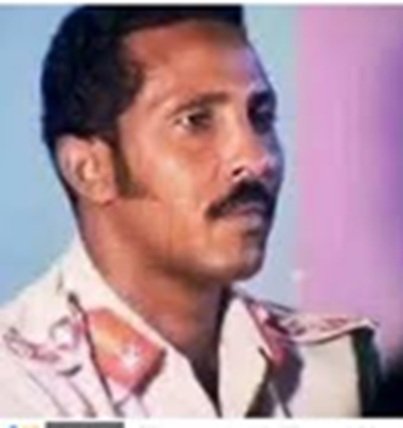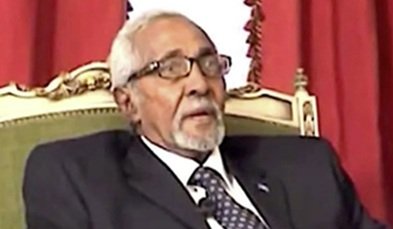By Abdiweli Garad, PhD
Brigadier General Ahmed Suleiman Abdalla, affectionately known as Dafle, passed away on 10 April 2025 and was laid to rest on 15 April 2025 in Muscat, Oman, at 87, leaving behind a wife, four adult children and four grandchildren. His departure marks the end of an era of steadfast leadership, unwavering dedication to national security, and a profound commitment to national peace and security. A figure of immense historical significance, General Dafle leaves behind a legacy that transcends military achievement, embodying the resilience and aspirations of the Somali people.
Early Life and Education
Born in 1937 in Burco, Northwest Somalia, into a Sufi family, General Dafle was among the first generation of students educated under British colonial rule in Somaliland. He completed his primary and intermediate education at Sheikh School before securing a scholarship to Aden, Yemen, where he attended secondary school. Upon returning to the protectorate in 1958, he was selected—alongside fellow future leaders such as Brigadier General Isma’il Ali Abokor and Colonel Mohamed Ali Shire—for officer training at the prestigious Royal Military Academy Sandhurst. Before commencing his military training at Sandhurst in 1959, he taught at Amoud Secondary School for a year.
Military and Political Leadership
Returning to Somalia in the early 1960s, following the nation’s independence, General Dafle played a pivotal role in safeguarding Somali sovereignty during a period of regional instability. He commanded critical operations along the Djibouti frontier, then still under French colonial rule, demonstrating strategic brilliance that solidified his reputation as a defender of Somali unity. Rising through the ranks from Lieutenant to Brigadier General, his career was marked by tactical ingenuity and an unshakable moral compass.
As one of the 25 members of Somalia’s Revolutionary Council (SRC) under Major General Mohamed Siyad Barre (1969–1991), Dafle occupied a central role in shaping the nation’s political and security landscape. He served as a member of the Politburo alongside Barre, Mohamed Ali Samatar, Hussein Kulmiye Afrah, and Ismail Ali Abokor, becoming a co-vice president. From 1971, he led the National Security Service (NSS), establishing a formidable intelligence apparatus whose foundations were later acknowledged by his coworkers such as General Abdullahi Gafow Mohamud. Additionally, he served as Minister of the Interior.
As a Linchpin for Liberation Movements Across Africa and the Broader Third World
General Ahmed Suleiman Abdalla played a defining role in shaping Somalia’s Cold War policies and strategic direction. As head of intelligence, he positioned the nation as a pivotal hub for Africa’s decolonisation movements and the fight against apartheid. Reflecting on this legacy, former South African President Thabo Mbeki underscored in his correspondence Somalia’s profound commitment to pan-African solidarity, noting its dedication to the continent’s collective liberation. Consequently, under General Dafle’s guidance, the Somali government became an active supporter of anti-colonial and anti-apartheid struggles across the region—backing liberation efforts in Djibouti, Angola, Mozambique, Rhodesia (now Zimbabwe), and the African National Congress (ANC). Additionally, Somalia provided military training to Burundi and lent support to Eritrea’s independence movement. As President Mbeki observed in his letter

“Mogadishu and Somalia remained in our memories as African places of hope for us, a reliable rear base for the total liberation of Africa, including our liberation from apartheid. Indeed, in later years, others of our comrades returned to Mogadishu, this time to work with the Somali government to prepare for the clandestine infiltration into South Africa of cadres of Umkhonto we Sizwe, who would travel to apartheid South Africa by sea, secretly departing from the Somali ports!” […] “Mogadishu served as the venue for a great African celebration.”
More importantly, General Dafle guided Somalia’s transition from an Eastern-bloc ally to a Western-leaning state. Serving as Interior Minister, General Ahmed Suleiman Abdalla, during the height of the Cold War, was the architect behind Somalia’s geopolitical realignment, who guided Somalia’s transition from an Eastern-bloc ally to a Western-leaning state. His significance is underscored in historical records, including a transcript of discussions between East German leader Erich Honecker and Cuban leader Fidel Castro, which noted:
“Suleiman served as the Interior Minister of Somalia and represented the right-wing faction within the Somali government. His role was significant in the context of the political discussions between Somalia and Ethiopia, as he was actively working to align Somalia closer to Saudi Arabia and imperialist countries. During discussions with foreign representatives, he maintained a severe stance and opposed leftist positions. […] Suleiman’s actions and political alignment contributed to the increasing power of the rightist group in Somalia, and he was seen as a key figure in the internal political dynamics affecting Somalia’s relations with Ethiopia.”
Castro further noted in his report that the “interior minister” had authorised the placement of surveillance devices within their residence, corroborating General Abdalla’s foresight and demonstrating his prioritisation of national interests over diplomatic relations with allied nations.
Exile and Enduring Principles
Following the collapse of the Barre regime, General Dafle was in exile in Europe, yet he remained deeply connected to Somalia. Unlike many of his contemporaries, he refrained from public denunciations of successive Somali governments. He steadfastly retained his Somali citizenship, travelling exclusively on his national passport despite the logistical challenges it sometimes posed. His humility, intellect, and respect for others left a lasting impression on those who knew and worked with him, as noted by former colleagues such as General Gafow.
Personal Reflections: A Teacher and a Unifier
I first had the privilege of meeting General Ahmed Suleiman Abdalla ten years ago in Muscat, Oman. From our initial encounter, his profound insight left a lasting impression on me, compelling me to engage further. Over a week, I gained invaluable knowledge from him through a series of meetings and interviews. In this obituary, I wish to reflect on two particularly vivid memories that resurface whenever I recall the General or hear his name mentioned: the incident at the mosque and my pursuit of the listings.
The first memory involves an outing to the seaside with the General, his brother-in-law Ayanle Mohamed Siyad Barre, and me, where we walked and swam before proceeding to the mosque. The wudu area was situated outside, and as I was the last to complete my ablutions, the iqamah was called while I was still outside. The congregational prayer had already commenced by the time I entered. Notably, the majority of Omanis adhere to Ibadi Islam. While Sunnis and Ibadis pray in the same mosque, they do not pray together—Sunnis must wait until the Ibadis have concluded their prayer. I began to join the congregation hastily, but the General stopped me, saying firmly, “Hold on, boy! This is not ours.” Initially perplexed, I complied. After we had performed our Salah, he approached me and remarked, “These people have learned to coexist despite their differences. Why, then, can our own society not do the same when we share everything?”
The second memory pertains to my request for the General to characterise prominent Somali figures as I listed their names in a single word. Below, I share some of his responses alongside the descriptors he had assigned to them. His responses were poignant:
| Figure | Description |
| Adan Abdulle Osman | Statesman |
| Abdirashid Ali Sharmarke | PM |
| Mohamed Siyad Barre | Father |
| Abdullahi Isse | (He wept deeply) |
| Isma’il Ali Abokor | Friend |
| Ali Khalif Galaydh | Genius |
I then asked about the rationale for using these words, and his response to HE Abdullahi Isse intrigued me the most. He stated,
“I have known Mohamed Siyad Barre since 1961. He was my commanding officer, later became my father-in-law after I married his daughter, and eventually assumed the presidency, during which time I served closely alongside him. I was present during the births of some of his children and observed his unwavering commitment to Somalia’s national ambitions, particularly the liberation of Ogaden. I also witnessed the collapse of that vision, as well as the profound grief he endured following the death of his son, Shire Mohamed—a young man he held in the highest regard. Throughout these experiences, I only ever saw him weep once: at the passing of Abdullahi Isse.”
“Yet my tears were not for these reasons. I wept because Isse had been my teacher—a mentor who shaped my understanding of governance. On 21 October 1969, I supervised the detained MPs and government officials at Beerta Qaranka (the National Farm). Many had begun a hunger strike in protest, and as a military officer unfamiliar with such dissent, I was at a loss. Then, Isse intervened unexpectedly, lecturing them calmly: ‘Honourable deputata (MPs), you must recognise the global and African context. Revolutions have swept nations, and men in our positions have faced execution. Yet here we are, detained in what is arguably the most serene and picturesque setting in the country—a place where we have historically sought respite. Let us de-escalate tensions and comply with orders. From that moment, I regularly sought his counsel. Our relationship evolved into a profound friendship, and I regarded him as a guiding figure and one of my most cherished companions.'”
A Final Farewell
Brigadier General Ahmed Suleiman Abdalla was a soldier, strategist, politician and statesman dedicated to serving his nation. His legacy endures not only in the institutions he helped build but also in the wisdom he imparted and the humanity he exemplified.
“O Allah, forgive him, have mercy upon him, grant him peace, and pardon him. Make his resting place spacious, as You have commanded.”
Abdiweli Garad, PhD
Email: aogarad@gmail.com
————-
Abdiweli Garad is a researcher focusing on state-building interventions and the associated security complexities of the HoA.


Leave a Reply